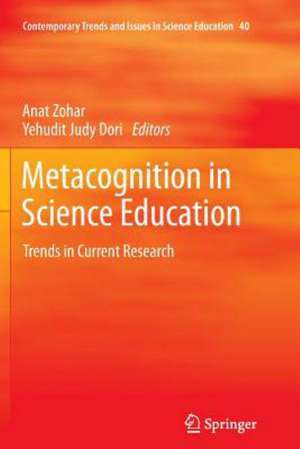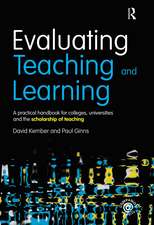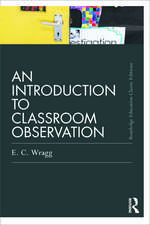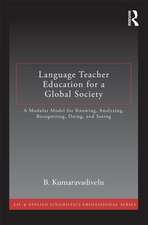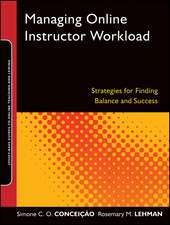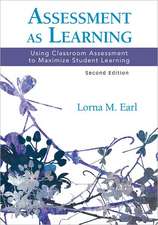Metacognition in Science Education: Trends in Current Research: Contemporary Trends and Issues in Science Education, cartea 40
Editat de Anat Zohar, Yehudit Judy Dorien Limba Engleză Paperback – 29 noi 2013
Metacognition in Science Education discusses emerging topics at the intersection of metacognition with the teaching and learning of science concepts, and with higher order thinking more generally. The book provides readers with a background on metacognition and analyses the latest developments in the field. It also gives an account of best-practice methodology.
Expanding on the theoretical underpinnings of metacognition, and written by world leaders in metacognitive research, the chapters present cutting-edge studies on how various forms of metacognitive instruction enhance understanding and thinking in science classrooms. The editors strive for conceptual coherency in the various definitions of metacognition that appear in the book, and show that the study of metacognitionis not an end in itself. Rather, it is integral to other important constructs, such as self-regulation, literacy, the teaching of thinking strategies, motivation, meta-strategies, conceptual understanding, reflection, and critical thinking. The book testifies to a growing recognition of the potential value of metacognition to science learning. It will motivate science educators in different educational contexts to incorporate this topic into their ongoing research and practice.
| Toate formatele și edițiile | Preț | Express |
|---|---|---|
| Paperback (1) | 559.99 lei 38-44 zile | |
| SPRINGER NETHERLANDS – 29 noi 2013 | 559.99 lei 38-44 zile | |
| Hardback (1) | 646.30 lei 43-57 zile | |
| SPRINGER NETHERLANDS – 20 oct 2011 | 646.30 lei 43-57 zile |
Din seria Contemporary Trends and Issues in Science Education
- 20%
 Preț: 568.91 lei
Preț: 568.91 lei - 20%
 Preț: 814.76 lei
Preț: 814.76 lei - 18%
 Preț: 951.77 lei
Preț: 951.77 lei - 15%
 Preț: 638.43 lei
Preț: 638.43 lei - 15%
 Preț: 636.80 lei
Preț: 636.80 lei - 15%
 Preț: 633.68 lei
Preț: 633.68 lei - 15%
 Preț: 637.46 lei
Preț: 637.46 lei - 18%
 Preț: 951.29 lei
Preț: 951.29 lei - 15%
 Preț: 644.95 lei
Preț: 644.95 lei - 18%
 Preț: 951.91 lei
Preț: 951.91 lei - 18%
 Preț: 1224.06 lei
Preț: 1224.06 lei - 18%
 Preț: 953.65 lei
Preț: 953.65 lei - 15%
 Preț: 641.71 lei
Preț: 641.71 lei - 15%
 Preț: 697.15 lei
Preț: 697.15 lei - 15%
 Preț: 644.18 lei
Preț: 644.18 lei - 15%
 Preț: 640.55 lei
Preț: 640.55 lei - 15%
 Preț: 640.06 lei
Preț: 640.06 lei - 15%
 Preț: 639.08 lei
Preț: 639.08 lei - 18%
 Preț: 1388.68 lei
Preț: 1388.68 lei -
 Preț: 389.31 lei
Preț: 389.31 lei - 15%
 Preț: 465.66 lei
Preț: 465.66 lei - 18%
 Preț: 1832.08 lei
Preț: 1832.08 lei - 15%
 Preț: 641.85 lei
Preț: 641.85 lei -
 Preț: 398.15 lei
Preț: 398.15 lei - 15%
 Preț: 644.18 lei
Preț: 644.18 lei - 18%
 Preț: 945.47 lei
Preț: 945.47 lei - 15%
 Preț: 644.30 lei
Preț: 644.30 lei - 18%
 Preț: 1215.04 lei
Preț: 1215.04 lei
Preț: 559.99 lei
Preț vechi: 699.98 lei
-20% Nou
Puncte Express: 840
Preț estimativ în valută:
107.16€ • 112.16$ • 89.19£
107.16€ • 112.16$ • 89.19£
Carte tipărită la comandă
Livrare economică 26 martie-01 aprilie
Preluare comenzi: 021 569.72.76
Specificații
ISBN-13: 9789400738201
ISBN-10: 940073820X
Pagini: 288
Ilustrații: VIII, 280 p.
Dimensiuni: 155 x 235 x 15 mm
Greutate: 0.41 kg
Ediția:2012
Editura: SPRINGER NETHERLANDS
Colecția Springer
Seria Contemporary Trends and Issues in Science Education
Locul publicării:Dordrecht, Netherlands
ISBN-10: 940073820X
Pagini: 288
Ilustrații: VIII, 280 p.
Dimensiuni: 155 x 235 x 15 mm
Greutate: 0.41 kg
Ediția:2012
Editura: SPRINGER NETHERLANDS
Colecția Springer
Seria Contemporary Trends and Issues in Science Education
Locul publicării:Dordrecht, Netherlands
Public țintă
ResearchCuprins
Introduction.- Metacognition in science education: Definitions, constituents, and their intricate relation with cognition.- Reading science: How a naive view of reading hinders so much else.- Metacognitive knowledge and field-based science learning in an outdoor environmental education program.- The role of metacognition in students’ understanding and transfer of explanatory structures in science.- Self-regulated learning and conceptual development in young children: The development of biological understanding.- The role of knowledge integration in learning chemistry with dynamic visualization.- The relationship between metacognition and the ability to pose questions in chemical education.- Explicit teaching of meta-strategic knowledge: definitions, student’ learning, and teachers’ professional development.- A metacognitive teaching strategy for pre-service teachers: Collaborative diagnosis of conceptual understanding in science.- Toward convergence of critical thinking, metacognition, and reflection: Illustrations from natural and social sciences, teacher education and classroom practice.
Recenzii
From the reviews:
“The book provides a comprehensive and detailed background on metacognition, and a clear perspective of recent research studies that testify to the value of metacognition for science learning. … is highly recommended for a wide readership as it provides a valuable resource for college or university teaching of metacognition … . It clearly highlights the implications of metacognition research for science learning and teaching and provides meaningful insights for classroom practitioners. … discussion of recent studies is informative and should prompt ideas for further studies.” (Umesh Ramnarain, International Journal of Environmental & Science Education, Vol. 7 (2), April, 2012)
“This book aims to promote the teaching of metacognitive skills by providing both a useful theoretical introduction about metacognition and its role in science education, as well as several chapters of case studies from across the science disciplines. … book has several useful case studies of a similar nature, along with data on their effectiveness in teaching. These, along with the extensive literature review chapters, will make it useful to both educational researchers and educators interested in embedding the teaching of metacognition in their practice.” (Michael Seery, Education in Chemistry, January, 2013)
“The book provides a comprehensive and detailed background on metacognition, and a clear perspective of recent research studies that testify to the value of metacognition for science learning. … is highly recommended for a wide readership as it provides a valuable resource for college or university teaching of metacognition … . It clearly highlights the implications of metacognition research for science learning and teaching and provides meaningful insights for classroom practitioners. … discussion of recent studies is informative and should prompt ideas for further studies.” (Umesh Ramnarain, International Journal of Environmental & Science Education, Vol. 7 (2), April, 2012)
“This book aims to promote the teaching of metacognitive skills by providing both a useful theoretical introduction about metacognition and its role in science education, as well as several chapters of case studies from across the science disciplines. … book has several useful case studies of a similar nature, along with data on their effectiveness in teaching. These, along with the extensive literature review chapters, will make it useful to both educational researchers and educators interested in embedding the teaching of metacognition in their practice.” (Michael Seery, Education in Chemistry, January, 2013)
Textul de pe ultima copertă
Why is metacognition gaining recognition, both in education generally and in science learning in particular? What does metacognition contribute to the theory and practice of science learning?
Metacognition in Science Education discusses emerging topics at the intersection of metacognition with the teaching and learning of science concepts, and with higher order thinking more generally. The book provides readers with a background on metacognition and analyses the latest developments in the field. It also gives an account of best-practice methodology.
Expanding on the theoretical underpinnings of metacognition, and written by world leaders in metacognitive research, the chapters present cutting-edge studies on how various forms of metacognitive instruction enhance understanding and thinking in science classrooms. The editors strive for conceptual coherency in the various definitions of metacognition that appear in the book, and show that the study of metacognitionis not an end in itself. Rather, it is integral to other important constructs, such as self-regulation, literacy, the teaching of thinking strategies, motivation, meta-strategies, conceptual understanding, reflection, and critical thinking. The book testifies to a growing recognition of the potential value of metacognition to science learning. It will motivate science educators in different educational contexts to incorporate this topic into their ongoing research and practice.
Metacognition in Science Education discusses emerging topics at the intersection of metacognition with the teaching and learning of science concepts, and with higher order thinking more generally. The book provides readers with a background on metacognition and analyses the latest developments in the field. It also gives an account of best-practice methodology.
Expanding on the theoretical underpinnings of metacognition, and written by world leaders in metacognitive research, the chapters present cutting-edge studies on how various forms of metacognitive instruction enhance understanding and thinking in science classrooms. The editors strive for conceptual coherency in the various definitions of metacognition that appear in the book, and show that the study of metacognitionis not an end in itself. Rather, it is integral to other important constructs, such as self-regulation, literacy, the teaching of thinking strategies, motivation, meta-strategies, conceptual understanding, reflection, and critical thinking. The book testifies to a growing recognition of the potential value of metacognition to science learning. It will motivate science educators in different educational contexts to incorporate this topic into their ongoing research and practice.
Caracteristici
Discusses emerging topics at the intersection of metacognition with teaching and learning of science concepts Presents cutting-edge studies on how metacognitive instruction enhances understanding and thinking in science classrooms Is a testimony to the growing recognition of the value of metacognition for science learning
